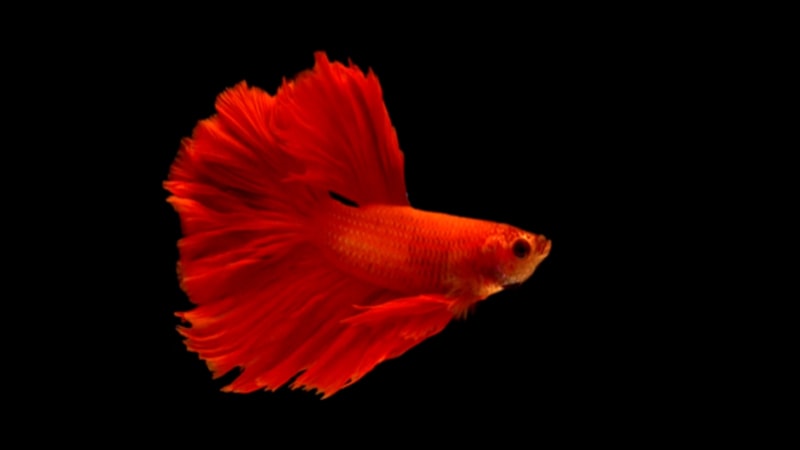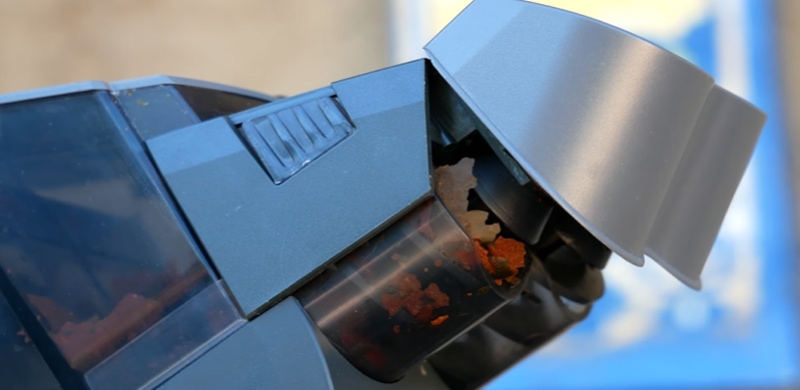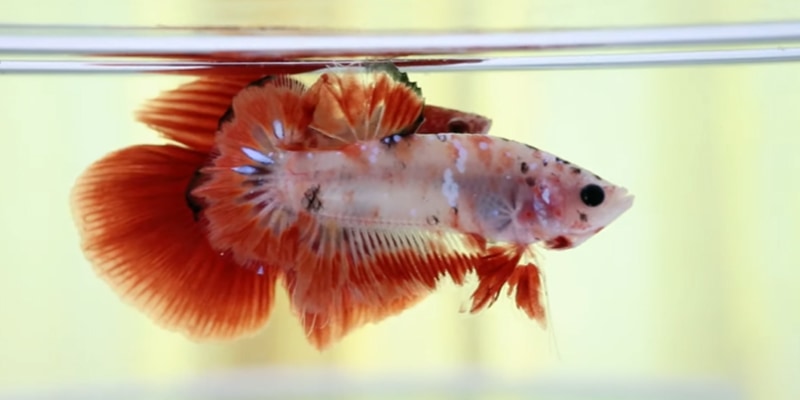Let’s say you are planning a vacation or a business trip away from home soon but do not know what to do with your bettas. Wondering that “How long can a betta fish go without food?”, “Is there a way to prepare fully for them when you are absent?”. If that’s the case, don’t worry; we’re here to answer all your questions.
We all know that betta fish are beautiful, colorful little fish commonly kept as house pets. They’re also known for being very active and energetic. According to many reliable sources of information, betta fish can go between 10 and 14 days without food. Nevertheless, you will need to consider several factors impacting this period. In addition, it’s never a good idea to leave them alone for such a long time without careful preparation.
Now, read on to learn the top factors that affect a betta’s ability to survive without food, and check out some suggested solutions.

How long can a betta fish go without food?
As we mentioned above, betta fish can go 10 to 14 days without eating. Then again, despite that, many factors affect this period. But this post will focus on three major aspects: tank size, filtered vs. unfiltered tanks, and the general health of bettas.
Tank size
First of all, let’s talk about the size of your aquarium tank. This factor helps us determine how long your betta fish can go without food.
In a smaller aquarium, the conditions within it will deteriorate faster. Therefore, a smaller aquarium will require frequent cleanings. It is important to remember that although your betta can survive without food for a short period, it will still need to live in poor conditions, which could potentially be very harmful or even cause your bettas to die.
On the other hand, if your betta fish lives in a large tank or even a community tank, the water conditions will be much less likely to deteriorate while you’re on vacation.
Filtered vs Unfiltered tank
The second factor we mentioned is the filter. Imagine your aquarium is small and has no filter, or the water in the tank is completely untreated for 10 to 14 days. It’s unlikely that your little starving Fish will be able to survive in such an environment like that.
When the tank is reasonably sized and the fish have uninterrupted access to the surface for oxygenation, betta keepers using unfiltered “fishbowls” are not harming their pets. But the situation is completely different if you plan to be away for 10-14 days.
Unfiltered tanks may suffer from a large amount of unwanted dirt when they are left unattended for a week and a half to two weeks. Despite its ability to go without food for a long time, this can seriously harm your betta fish’s health.
Betta overall health
Another major factor that impacts a betta fish’s ability to survive for long periods without food is the betta’s overall health. Aside from external factors, a betta’s age, metabolism, general health, and stress level will affect the fish’s response to increased stress levels, hunger, and unfavorable water conditions for 10-14 days… Younger bettas are better at handling stress, and unsuitable water environment. In contrast, older ones may have more fat reserves to draw upon when hungry.
Regardless of a general guideline, not all bettas are the same, meaning they all have different amounts of time they can be left unattended. Please remember that allowing your betta fish to fast for extended periods should not become the norm or a routine occurrence. The only time you should leave your betta fish tank unattended is when you have no choice.
How to feed your betta fish when you are away
Alright, even if you have to leave your Fish alone because of force majeure, you should still prepare enough food for them. Here are a few ways that we think will work for you.
Feeding blocks
Currently, there are many types of fish-feeding blocks that you can choose from on the market. While you are on a trip, feeding blocks can keep your betta fish fed and give you peace of mind. Due to the property of being able to dissolve in water over time, they are capable of keeping your Betta fish fed for several days. Depending on how long you will be away, you will need different numbers of feeding blocks.
Automatic Fish Feeder

Using an automatic fish feeder may be worthwhile if you are gone for more than three days. You won’t need to worry about your betta being overfed, as they will release food in appropriate amounts. However, compared with the above method, although it is more convenient, it requires higher costs.
How to Prepare a Betta Fish Tank Before Leaving
A well-prepared aquarium with all the necessary conditions will minimize the numerous negative effects on your little friends during your absence. Let’s find some helpful hacks together.
Optimize the tank’s conditions
First, ensure that your betta fish are kept in a healthy environment while you are gone by optimizing your tank’s conditions.
A week before leaving, keep in mind to check the filtering system; siphon the gravel to remove leftover food and debris; check the water quality (pH level should be between 6.8-7.5); trim aquatic plants; remove dead plant matter; check all of the equipment in your betta tank to ensure it’s working properly (filter, heater, air pump, automatic feeder, light fixtures, etc.)..).
On the leaving day, you also need to confirm that the water temperature is between 75 and 80°F, check the health of your bettas, and don’t forget to feed them before you’re away.
Check the tank’s heater
Next, be sure that your heater is working properly so that the bettas will not spend too much time in water that is too warm or too cold. The best temperature for betta fish in the tank is between 75 and 81 degrees Fahrenheit.
Besides, make sure there is no AC making the room unnecessarily cold, no heat making the room unnecessarily hot, and ensure that the tank (especially if it is a small tank) does not receive direct sunlight. Avoid placing the tank near any vents that might exhaust hot or cold air.
Use cooler water temperature
If you plan to be away for a week or two, keeping the water temperature at a lower temperature (73-75°F) in your betta’s tank is actually helpful, which can extend the number of days that your betta can go unfed.
The temperature will slow down their metabolism, reducing the number of calories they need to survive and preventing them from burning through their fat stores. Despite being a bit slow and sluggish, your bettas will feel less movement and need to move around because they’re not starving.
Keep your tank lights on a timer
Bettas would be stressed out if they didn’t get any light while you’re away in the same way they would be if they stood in direct sunlight or had lights constantly on.
So, this step aims to minimize your betta fish’s stress levels since following a diurnal schedule allows fish to self-regulate. Putting your aquarium lights on a timer with 8 to 10 hours of light per day will allow your fish to relax at night and explore during the day.
Make sure your betta tank has a lid
Guarantee that you have a top in the tank when you’re absent for a long time. As you may already know, betta fish feed at the surface. After 3–4 days of being away, the water quality will drop, so bettas will be more inclined to search for oxygen and even make a break for it.
As a result, if you are gone for a long time, the water quality in your tank drops, causing the bettas to come to the surface for more oxygen and try to jump out!
Get enough oxygen for your betta
It is important for betta fish and any aquarium pet to receive an adequate supply of oxygen, so remember to check that your tank cap has unobstructed ventilation areas and does not cover the tank to the brim.

Take a quick health check
A quick check on your betta fish’s health before leaving for an extended time is essential. If its sickness signs are clear and you still have time, quickly isolate that fish from the other aquarium and take steps to examine it. In an emergency, though, all one can do is wish for the best.
FAQs
Can a betta survive four days without food?
As we mentioned, a betta fish can go 10 to 14 days without food. You should, however, remember that after a week, it starts wasting its fat reserves, which can lead to starvation, organ damage, and other health problems for your betta fish. The situation is worse for immature betta fish since their fat reserves are not as developed as those of mature bettas.
How often should bettas be fed?
Feeding your betta fish two to four pellets once or twice daily is recommended. When pellets are placed in water expand and become very filling for your betta fish. You can substitute freeze-dried or fresh food for their pellets one to two days a week.
How long can a betta fish go without water?
Bettas live in shallow water in the wild, such as rice paddies, marshes, and ponds. This gives them an advantage in terms of survival. However, all Fish are vulnerable when they are not in the water. Your Betta Fish can probably live outside their tank for no more than 2 hours.
Video: How to make THE BEST Betta Fish Tank

Victoria has always loved pets. Watching the animals at the zoo was her favorite thing. Her first volunteer job was at the local animal shelter, Gateway Area Humane Society. It was fun to spend time with all the animals.
Victoria M. Pierce decided to pursue a career in veterinary medicine after high school. Victoria graduated from North Carolina State University with a degree in veterinary medicine. She has been a veterinarian for ten years. It’s her passion to help animals and make a difference in their lives.
Animal rights and welfare are Victoria M. Pierce’s passions. Victoria believes all animals deserve respect and compassion. As a veterinarian, she strives to provide her patients with the best care.